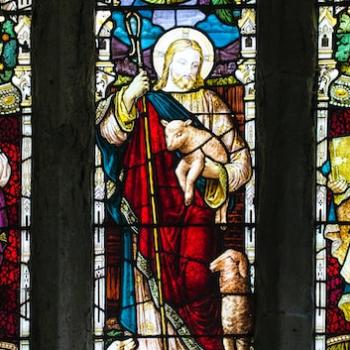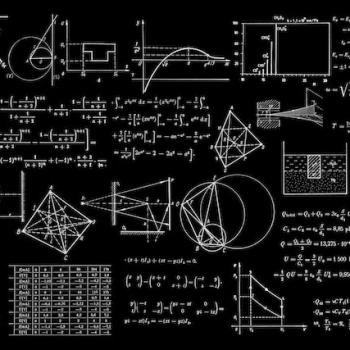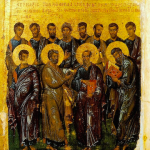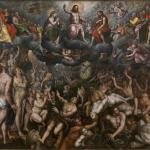Jesus’ healing of Peter’s mother-in-law from today’s Gospel has a lot to say about our innate wholeness.
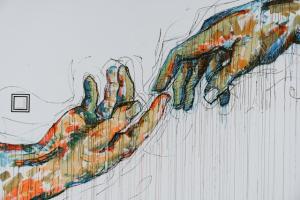
My ACT scores suggested not so much genius as dissociative identity disorder. There were two distinct personalities who took the test. One was almost gifted (my word, not the College Board’s) in English and reading. The other was… less so. Math and, to an even greater degree, science left me frequently confused. And my scores showed it.
Ironically though, I have gained an appreciation for and genuine interest in science over the last couple decades. I have enjoyed learning about the origins of the universe, the relative nature of spacetime, and the wacked-out, freakish behavior of subatomic particles. Science, it turns out, is a fascinating portal into ultimate meaning.
A Sacred Singularity
Some feel that science and religious faith are incompatible, but I disagree. I believe they are two languages used to talk about the same truths. Take the Big Bang, for example. I am captivated by the theory that the miracle of life today in all its complex diversity began as an initial singularity. The idea that a tiny spec of cosmic potential exploded and expanded into, well, everything is deliciously enchanting to me. And not at all inconsistent with the truth of the creation stories in the Book of Genesis. Each one – the world in seven days and Adam and Eve are two different stories – seeks to convey the truth that all life came from God and all of it is “good.” Two languages, one truth.
But we forget this original wholeness and unity though in favor the deceptively alluring belief that we are separate – from each other, the earth around us, all of life. This collective amnesia about our common lineage becomes the only reality we know. So, how do we find our way back from the pain of division and separation to the sacred oneness from which we came? The gospel readings for the Fifth Sunday of Ordinary Time point to a pretty good answer.
Mark’s gospel during Cycle B tells the story of Jesus visiting Simon’s house where his mother-in-law was sick with a fever. There’s a clean and simple formula Jesus uses to return her to health and make her whole again: “He approached, grasped her hand, and helped her up” (1:31). Fully restored, she hopped up and started serving the tea and cookies.
He Approached
The word “approach” comes from the Latin appropiare which means to “draw near.” The first step, then, in getting back to our factory setting is to draw near to that which we have previously understood as “other.” Pope Francis is fond of using the word, “encounter,” to describe this desire and responsibility we have to draw near.
As reported in L’Osservatore Romano, his homily on September 13, 2016 was an “’invitation to work for ‘the culture of encounter,’ in a simple way, ‘as Jesus did:’ not just seeing, but looking; not just hearing, but listening; not just passing people by, but stopping with them; not just saying “what a shame, poor people!”, but allowing yourself to be moved with compassion; ‘and then to draw near, to touch and to say: ‘Do not weep’ and to give at least a drop of life.’”
If wholeness is both our birthright and destiny, then such a ‘culture of encounter’ is simply enlightened self-interest. If you and I are really one, then it only makes sense for me to be concerned for you. Even if I hate everything you stand for. Even if you are cruel and selfish and have hurt me deeply. Even if you are my enemy. Paradoxically, it’s in caring for you that I take care of myself.
He Grasped Her Hand
But as hard as it is to feel for those who seem completely “other,” it’s far more challenging to take actually do something. It’s one thing to see the filthy person by the side of the road holding the cardboard sign that reads, “Homeless and Broke.” It’s quite another to stop and ask him how he is, especially if his own poor choices landed him there. It’s quite another still to offer him a blanket or a sandwich, especially when he makes it clear he’d prefer cash.
But this “grasping of the hand,” this skin-on-skin contact with others, seems pretty non-negotiable for Jesus. Is it merely coincidence that that the physical acts of “grasping” another in kindness – a shared smile, a warm handshake, a big bear hug – all feel so good? I don’t think so. They feel so good because they get us back to who we really are. It can’t be any accident that sex, the most intense form of physical union, gives us so much pleasure. We are not meant to be separate.
He Helped Her Up
The thing I love about the way Jesus heals Simon’s mother-in-law is the complete lack of special effects. There’s no booming James Earl Jones voice proclaiming victory over death. There are no fireworks set to music, no neon signs, no rabbits in hats, no burning bushes. The miracle happens when Jesus simply “helped her up.”
To me, the message is clear – do something that’s not nothing. I’m not going to cure cancer or eliminate food insecurity. But I can sit with someone during chemo and donate to a food bank. As Saint Theresa of Calcutta famously said, “Not all of us can do great things. But we can do small things with great love.” Those “small things” are the real miracle because they take us one step closer to the richness of our true selves.
A Simple Formula
The formula for remembering who we are and where we came from is clean and simple in this week’s Gospel reading. But as anyone who’s lived on earth more than a couple minutes knows, clean doesn’t mean uncomplicated, and simple doesn’t mean easy. Sometimes it’s crazy-hard to approach, grasp her hand, and help her up. It requires a commitment to doing small things with great love that makes us into the salt of the earth and the light of the world that Matthew describes in Cycle A. It takes the deep waters of a “culture of encounter” to be able to reel in the big fish like Luke describes in Cycle C. But you end up with tea and cookies.








